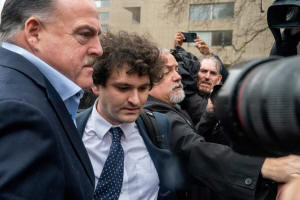|
Citing Bankman-Fried's "recent attempts to contact prospective
witnesses," prosecutors asked U.S. District Judge Lewis Kaplan
to ban Bankman-Fried from communicating with current or former
employees of FTX or his Alameda Research hedge fund, other than
family, unless a lawyer is present.
They also asked that Bankman-Fried not use Signal or other
encrypted call and messaging applications, though he could still
communicate through text messages, email and the phone.
Bankman-Fried, 30, has been free on $250 million bond and
required to live with his parents since pleading not guilty to
looting billions of dollars from the now-bankrupt FTX.
Lawyers for Bankman-Fried did not immediately respond to
requests for comment.
In Friday's letter, prosecutors cited a Signal message on Jan.
15 from Bankman-Fried to "Witness-1," the general counsel of the
FTX U.S. affiliate. Bankman-Fried expressed interest in having a
"constructive relationship" or "at least vet things with each
other."
Prosecutors said this was "particularly concerning" because
Bankman-Fried knew the general counsel had potentially damaging
information, having participated just before FTX's November
collapse in communications in which Bankman-Fried discussed
using Alameda funds to satisfy FTX customer withdrawals.
"The defendant's request to 'vet things with each other' is
suggestive of an effort to influence Witness-1's potential
testimony, and the appeal for a 'constructive relationship'
likewise implies that Witness-1 should align with the
defendant," prosecutors said.
"Even if the defendant has not directly attempted to tamper with
witnesses, (his) contact with witnesses may intimidate them"
into not coming forward or testifying, prosecutors added.
In seeking to keep Bankman-Fried off Signal, prosecutors said he
had in 2021 directed that many Signal and Slack communications
be autodeleted within 30 days.
Prosecutors said former Alameda chief Caroline Ellison, who
pleaded guilty in the case and is cooperating with them, told
them Bankman-Fried had indicated it could be harder to build
legal cases if information were not preserved.
(Reporting by Jonathan Stempel in New York; Editing by Cynthia
Osterman)
[© 2023 Thomson Reuters. All rights
reserved.]
This material may not be published,
broadcast, rewritten or redistributed.
Thompson Reuters is solely responsible for this content.

|
|




